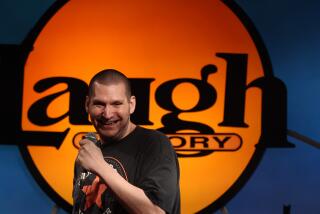Virtual-Reality Games Strike at Autism
- Share via
If you sell sweatshirts for $170 and charge $198 for warmup pants, you can assume your customers aren’t really buying your clothes to work out.
So when the Italian family behind the chichi Ermenegildo Zegna store in Beverly Hills was ready to launch its ZegnaSport line, they rounded up celebrity athletes and actors and had them compete in--what else--virtual sports.
Last week, the Zegna clan shut down one block of Rodeo Drive and transformed it into a giant urban video arcade for a combination publicity stunt and fund-raiser for the charity Cure Autism Now. Celebrities such as Dan Marino, John Elway, Anthony Edwards and Dylan McDermott went head-to-head on a digital football field, a computer-generated golf course and three other virtual venues as more than 700 spectators and members of the USC marching band cheered them on.
As the games got underway, the biggest crowd gathered around a batting cage fronted with a giant screen displaying a digital rendition of a baseball stadium. Star quarterbacks Marino and Elway took turns standing at home plate and swinging a real wooden bat at a computer-generated baseball as it appeared to sail into the strike zone.
A fleet of sensors compared the motion of the bat with the trajectory of the pitch. Then a computer calculated whether the swing was enough to send the ball out of the virtual ballpark.
James Solis, a freelance camera assistant from Inglewood who crammed into stadium-style metal bleachers with dozens of other fans, said he wanted to see Elway bat because the former football star had originally been drafted by baseball’s New York Yankees. But Elway’s single season as a Yankee minor leaguer didn’t pay off for him this night: Marino hit five home runs, while Elway was shut out.
“I can’t say this is very close to baseball,” said Solis, who attends about 30 real games during baseball season. “But it’s about as close as you’re going to get to seeing them play baseball.”
Elway chalked up his poor performance to a lack of preparation.
“Other than the NFL, I’ve done no training, so I guess I’m behind the curve,” he said.
Elsewhere along the block, players threw footballs at moving targets on an oversized video screen and sat on plastic motorcycle seats and raced around an animated course reminiscent of the pod-racing sequence in “Star Wars Episode 1: The Phantom Menace.”
The virtual-reality boxing ring was the most cutting-edge event, as well as the most entertaining. Boxers donned VR goggles, which allowed them to see their computer-generated opponents. (Fans could see them on screens beneath the ring). They also held plastic grips with buttons to let them throw left and right jabs. But because competitors were stationed a fair distance from each other for safety’s sake, their punches landed amusingly in thin air.
“Some of those guys should’ve been embarrassed,” said Marna Wollman, a sales manager for Loews Santa Monica who attended to support the autism charity. “They’re hitting like their sisters.”
But they did help the Zegnas raise more than $100,000 for Cure Autism Now, a charity supported by Marino and Zegna President Richard Cohen, who both have autistic children. Spectators gave $150 each, and players donated $1,000 apiece.
The teams led by Elway and “ER” television star Edwards tied for first place and received shiny medals on blue ribbons for their efforts. Marino made the presentations, but not before he accused Elway’s team of cheating.
“We should have won,” Marino insisted. Then he got busy with his real workout for the night--signing autographs on ZegnaSport baseball caps.
Karen Kaplan can be reached at karen.kaplan@latimes.com.
More to Read
Go beyond the scoreboard
Get the latest on L.A.'s teams in the daily Sports Report newsletter.
You may occasionally receive promotional content from the Los Angeles Times.











